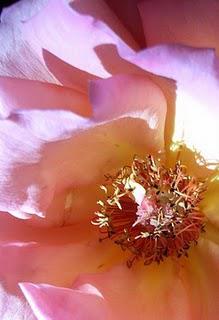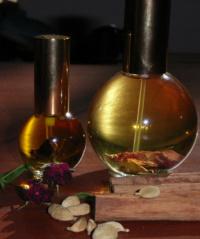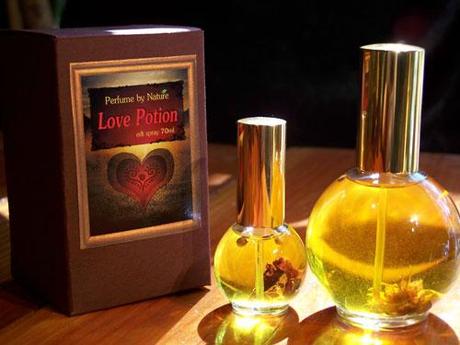 There's been a debate withon the natural perfume community lately, as to what the difference is between Natural or Botanical Perfumery and Aromatherapy.
There's been a debate withon the natural perfume community lately, as to what the difference is between Natural or Botanical Perfumery and Aromatherapy.Conventional Perfumery has been poo pooing Aromatherapy ever since it started to become popular in the 1980's. But then Conventional Perfumery poo poos Natural Perfumery too, so I don't really see how their opinion matters either which way here.
Aromatherapy is the art of useing essential oils to create a certain therapeutic effect, both emotionally and physically. As I wrote in my previous blogpost, essential oils have been used for centuries, both in perfumery and for medicinal purposes.
All scents have an effect on our emotions and hence our bodies, be they natural or artificial.
Our sense of smell is directly linked to the emotional part of our brain, which in turn has a direct biochemical effect on our body, raising or dropping levels of hormones and other biochemicals depending on the scent.
Musky scents arouse us, sweet and foody scents make us salivate and increase stomach aci, citrus scents and mints make us feel awake and refreshed, regardless of their origin!
So from that point of view, ALL perfumes are a form of Aromatic- Therapy.
To get back to the nitty gritty though, modern Aromatherapy defines itself by the use of individual or combinations of pure and natural essential oils, either by diffusion or application to the body in form of massage oils & suchlike. And the focus is initially mainly on the effect of said oils, rather than the actual smell itself.
 Natural or Botanical Perfumery in contrast, focuses primarily on the smell created by combining different natural materials.
Natural or Botanical Perfumery in contrast, focuses primarily on the smell created by combining different natural materials.The pallette of Natural Perfumery is also much larger than the that used in most schools of Aromatherapy, drawing not only on essential oils, but also a wide variety of absolutes, extracts, resins, herbal, fruit and other infusions and basically, anything natural that has a pleasant scent!
I should probably mention here that, much as I love Aromatherapy, use it on a daily basis and am incredibly grateful that it's has introduced millions of people to the benefits of useing essential oils, I am a bit critical of a lot of the stuff touted in aromatherapy courses.
I started working with essential oils before Aromatherapy had hit the big popularity stakes, and have viewed it's evolution at first with great joy, then with growing annoyance.
Essential oils are wonderful things, and their effects can be amazing...
But a lot of the the textbooks have stolen their information wholesale from each other, and most of it is simply cribbed directly from much older books on herbal medicine. And this simply doesn't work.
An essential oil is the volatile part of a plant made available by distillation. The plant itself in many cases contains many other chemicals that may or may not be important in it's physical effect on the body.
On top of that, there is a huge difference in the way your body aborbs things, and drinking a tea made from a herb (which is the way most herbal medicines are taken) is a very different thing to having the dilted oil from the same plant rubbed onto your skin during massage.
This becomes very obvious when you read the warnings about when which oils are safe for use during pregnancy. They are, for the main part, pure fiction, and merely the result of essential oil traders trying to cover their sue-able butts.
Arnica, for instance, is toxic if drunk as a tea...but makes a fantastic bruise and varicose vein salve when applied to the legs externally!
Unluckily, as I mentioned above, the text books all quote each other, and somehow this new school of thought with the many faulty text books has managed to wrangle it's way into higher education, so you can now become a "certified" aromatherapist....
Enough of the side rave though, getting back to perfumery, and the question of whether a natural perfume can be an "Aromatherapy Perfume".
Like all of these natural terms, there is no official definition.
For myself, I define it this way:
Most of the perfumes I make are essentially Aromatherapy Perfumes, because when I am designing a perfume, I usually have the effect I want it to have formeost in my mind. I have always used Scent primary to create a certain atmosphere, or as a direct kind of scent therapy.
 "Love Potion" for instance was designed for a friend in need of that very thing!
"Love Potion" for instance was designed for a friend in need of that very thing!And the ingredients in it are all ones that have an aphrodisiac, stimulating effect on the body and on the emotions. It contains things like Jasmine absolute and Coriander and Cardamon essential oil, all of which you can find listed in aromatherapy textbooks as aphrodisiac and stimulating to the senses....
What makes it a great perfume, is the way they are combined. The balance of each ingredient, and the way they all play together in the blend!
